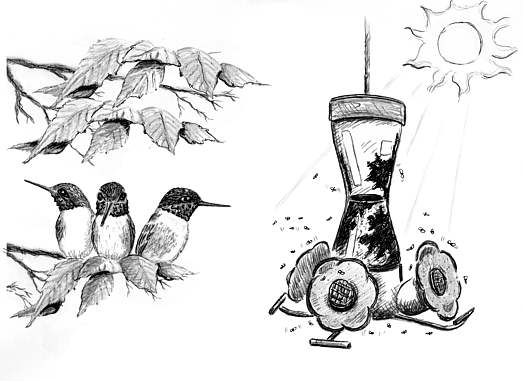
Dear Bird Folks,
I would like to know if there is anyway to prevent mildew from forming inside my hummingbird feeders. I try to change the solution often but I still get mildew. Any suggestions? Thank you.
-Marie, Mahopac, NY
YouÕre Welcome Marie,
It was June of 2000, when we started writing this column. It is now June 2005. That makes five years. That equates to one column each week, times 52 columns per year, times five years, equals 10,000 columns. I’m not sure but I think I may have gotten the math wrong there. Actually, I know I got the math wrong, but 10,000 sounds so much more impressive than mere 260. However, I’m only exaggerating for your sake, Marie, because whatever the number is, you need to know that you are the only person to ever write “thank you” at the end of the question. I knew that if I hung on long enough, somebody, someday would show me some appreciation. I just never would have guessed it would be someone from Mahopac. I really should deliver you a bouquet of flowers personally, but since I have no idea where the heck Mahopac is, I’ll simply say “you’re welcome” and save myself some gas money.
Mold (aka mildew) is a big problem in hummingbird feeders. Evidently, the simple sugar water solution that we use in our hummingbird feeders is just right for attracting and growing lovely black mold. Did you ever do that experiment in high school where you would put a few drops of sugar water on a piece of bread and watch mold form? No? Well, I didn’t do it either. I was too busy eating the bread, but I do remember watching other kids do it. The purpose of the experiment was to show that mold, which is really a fungus, loves two things, water and food, i.e. the sugar.
Some molds are good. Penicillin, of course, comes from a very good mold. Other molds are bad, like the kind that gets into you hummingbird feeder. Still other molds are down right nasty. The worst is the infamous Jell-O mold, the kind with the hunks fruit cocktail in it. Talk about evil. Fortunately a team researchers, lead by doctors Ben and Jerry, have found a way to remove that awful mold off the dessert list of civilized society. They may have saved us all.
You are right to be concerned Marie, mold in your feeder is not good for the birds. You mentioned that you changed the solution “often,” but if you are still getting mold then the answer would be to change it more often. The rule of thumb is to change it every three days but if that isn’t getting the job done, try changing you food every other day. If that doesn’t help, try weakening your formula. The stronger the sugar content the faster the mold can grow. The most common mixture is four parts water to one part sugar. Some generous people add more sugar and make a three to one mixture. That’s not a great idea. A richer mixture may cause mold to grow faster and it could also lead to an epidemic of hummingbird diabetes.
Many people boil the water before they add the sugar. The thought is that the boiling retards the mold growth. That maybe a good thing to do, but I’ve always been too lazy to try. If you aren’t a slacker like myself, you may want to try boiling and see if that helps. One other thing to try is to move your feeder into the shade. Shade seems to slow mold growth in hummer feeders, which is surprising since most mold loves shade. Go figure.
As we’ve mentioned in the past, the flat soucer-like feeders are the easiest to clean. Removing mold should not be a problem with that style feeder. However, if you are using a one of those silly complicated feeders, that looks like a Roman fountain, you may have problems. If you can’t reach the mold with any kind of brush try soaking the feeder in a mild solution of a 1/4 cup of bleach to one gallon of water. Hippies can use white vinegar and water (four to one) instead of bleach. After soaking, rinse the feeder thoroughly and pour the remaining solution over organic greens. It makes a lovely dressing.
I’m glad you wrote in Marie. Hummingbird feeder maintenance is important. I hear about too many feeders that are left unattended for days or weeks at a time. Once the food has spoiled the birds will not use it no matter how hungry they are. Some researchers claim that hummers would rather let themselves starve do death than eat spoiled food. Which is exactly how I feel about fruit cocktail mixed into a Jell-O mold.